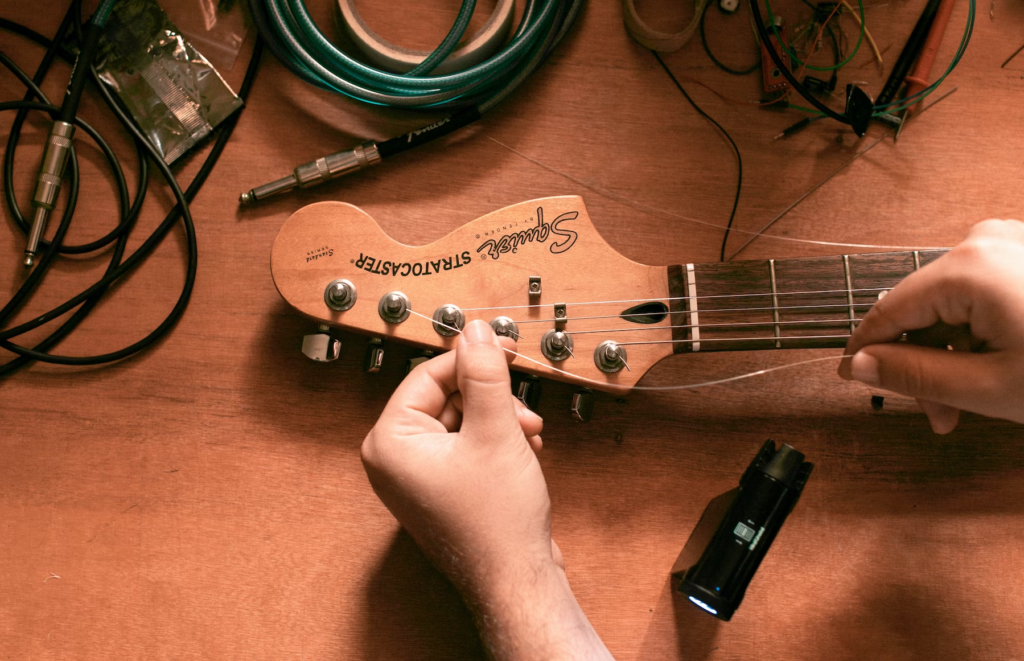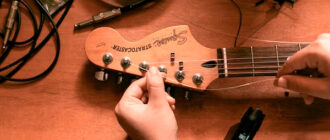
Best Guitar for Bluegrass: Hey bluegrass enthusiasts! Looking for the ideal acoustic guitar for those soulful tunes? You’re in the right place! Explore the world of bluegrass guitars, covering tonewoods, acoustic tones, and more. Find your perfect instrument for bluegrass adventures. Grab your pick and dive into the best acoustic guitars!
Table of Contents
What Is the Best Tonewood for Bluegrass?
When it comes to bluegrass guitars, the choice of tonewood is crucial, and you need to excel at it. Many guitarists prefer the warm and balanced tones produced by guitars with rosewood back and sides. However, the classic Martin D-18, with its mahogany back and sides, is also highly regarded in the bluegrass community for its distinct and punchy sound, a louder one.
Ultimately, the best tonewood for bluegrass depends on your personal preference and the sound you’re looking to achieve. If you want a softer sounding, choose a tonewood for that, because no tuner would help you achieve a superb warm sound with an unfit guitar. But if you want to be loud enough, choose another guitar, like D-18V from Martin Guitars. The right choice really comes with experience of playing country and bluegrass, or any other genre.
Are Taylor Guitars Good for Bluegrass?
While Taylor guitars are known for their versatility and exceptional craftsmanship, they may not be the first choice for traditional bluegrass music. Taylor’s bright and clear tones, often associated with their grand auditorium shape, may not provide the depth and warmth desired by bluegrass musicians. However, don’t let that discourage you if you’re a fan of Taylor guitars! You can always experiment with different strings and setups to achieve a bluegrass-friendly sound. But maybe for accuracy use an appropriate bluegrass acoustic guitar.
What Guitar Strings Are Best for Bluegrass?

Image by Alexis Baydoun from Unplash
When it comes to strings, bluegrass musicians often opt for phosphor bronze strings. These strings offer a bright and crisp tone, perfect for cutting through the mix during those lively jam sessions. Brands like D’Addario and Martin produce excellent bluegrass-oriented string sets that can take your playing to the next level. Remember, experimenting with different string gauges and brands can help you find the perfect combination that suits your playing bluegrass style and sound preference in acoustic music. Guitars and banjos both are used in this genre.
Best guitar for bluegrass?
Ah, the Martin guitar – a staple in the bluegrass world, an amazing bluegrass instrument. The Martin D-18 and D-28 are often regarded as the best bluegrass Martins, renowned for their rich, booming tones and incredible projection when you play the guitar. These dreadnought-style guitars are favorites among bluegrass legends like Norman Blake and Tony Rice and other bluegrass guitarists. However, keep in mind that your choice of the best bluegrass Martin ultimately comes down to personal preference in bluegrass instruments. Each guitar has its unique character, and you should choose the one that speaks to you, be it a bass guitar or a dread nought or even a fiddle.
Top Bluegrass Guitar Recommendations:
1. Martin D-18: A classic choice with a balanced and powerful sound. D18 is a great choice, but you might also consider D28, a Martin D-28, a pro guitar for bluegrass because of the quality of the fret.
2. Gibson J-45: Known for its warm and woody tone, it’s favored by many bluegrass enthusiasts. I’m going to recommend this as a base choice which is comfortable almost for anyone.
3. Yamaha LL16M: An affordable option that offers exceptional playability and a well-rounded sound. I’ve been playing this one for the longest time.
4. Alvarez Masterworks MF75SCE: This dreadnought beauty delivers a full-bodied sound with great projection. I’ve played this one a few times, but it doesn’t come easy to me. Although my friend plays the best bluegrass, I’ve ever heard with this one.
5. Norman Blake B30: Designed in collaboration with the legendary Norman Blake, this guitar captures the essence of bluegrass. What’s so amazing about this one is the impact of the famous musician.
What are the Key Properties of a Bluegrass Guitar?

Image by Victor Raimundo from Unplash
A bluegrass guitar should be loud, clear, and have excellent projection. Look for a guitar with a dreadnought shape, as it offers a powerful and resonant sound. The top wood, often Sitka spruce, should be able to handle heavy picking and produce a bright and focused tone. Additionally, a guitar with a comfortable neck and low action allows for smooth fretting and fast flatpicking.
The size of the soundhole might also be important for the blues. See what guitars suit you, what setup is comfortable for you. You might choose a versatile guitar with which you can’t go wrong. Some guitarists like to think that you need a special guitar for every genre but if you just want to play some music and look and sound cool, use your regular guitar. Someday you might purchase another one, but it is not necessary to own dreadnoughts to play bluegrass. The bottom line is you should enjoy yourself and your music.
Can Bluegrass Guitars Be Electric?
While bluegrass is traditionally played on acoustic guitars, there’s no reason why you can’t experiment with electric bluegrass! Electric guitars can add a unique flavor to your bluegrass music, especially when combined with effects pedals and amplifiers. So, if you’re feeling adventurous, go ahead and plug in that bluegrass magic and individualize the dreadnought style! Acoustics tend to be more common for that genre though.
Tips:
1. Experiment with different picks to find the one that suits your playing style and provides the desired tone and brightness of sound.
2. Consider using a capo to explore different keys and add variety to your bluegrass repertoire.
3. Don’t be afraid to try out different guitars and setups to find your perfect match.
Warnings:
1. Remember to take care of your guitar by maintaining proper humidity levels and regular maintenance.
2. Be mindful of your playing technique to avoid strain or injury.
Finding the best guitar for bluegrass is a journey filled with excitement and discovery. Whether you’re drawn to the warm tones of a Martin D-18 or the versatility of a Taylor guitar, the decision ultimately comes down to your personal preference and the sound you want to achieve. So, keep exploring, keep picking, and let the sounds of bluegrass fill the air as you embark on your musical adventure. Happy strumming!
If you have any issues with the website, check if your JavaScript is disabled.






